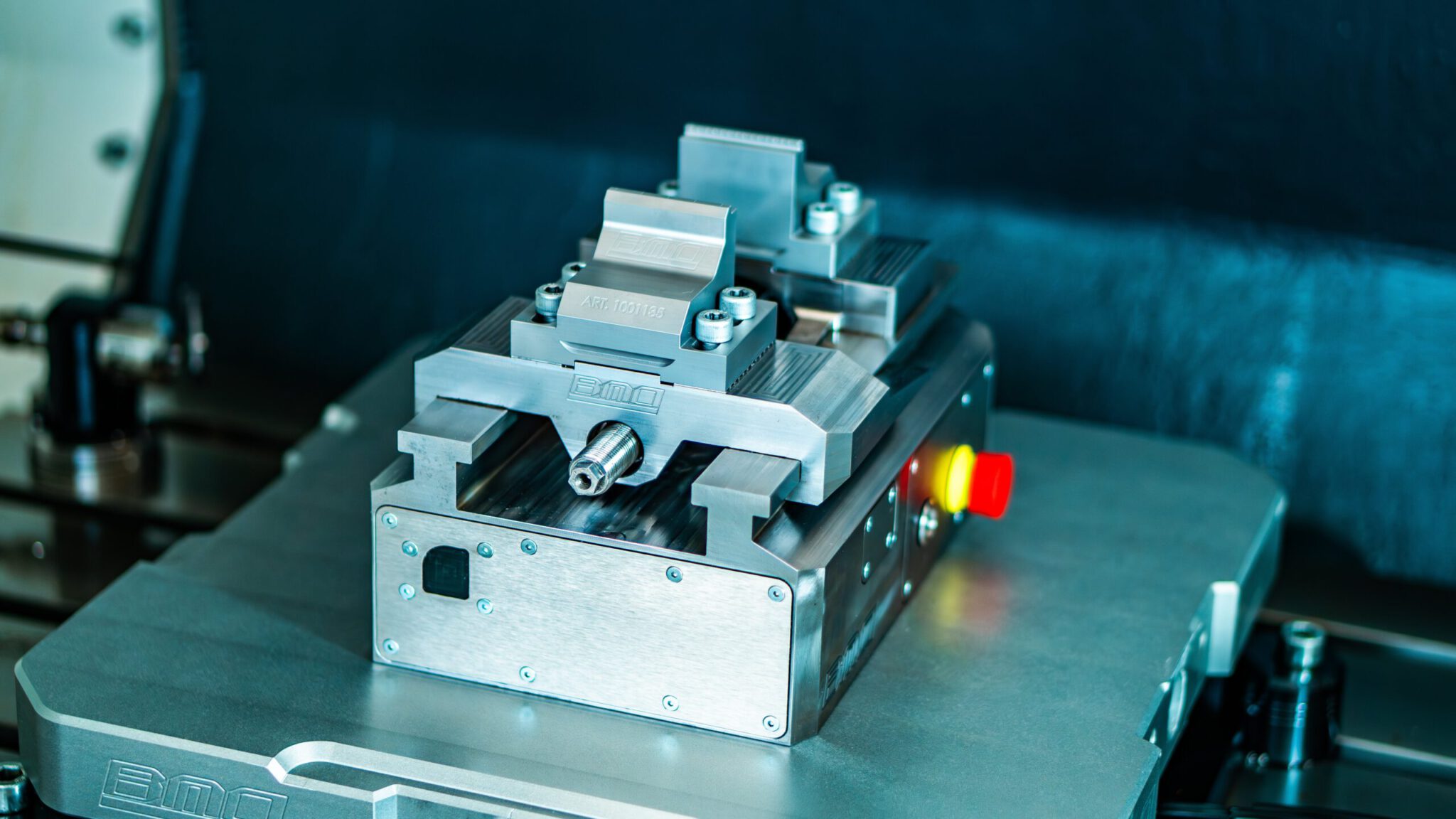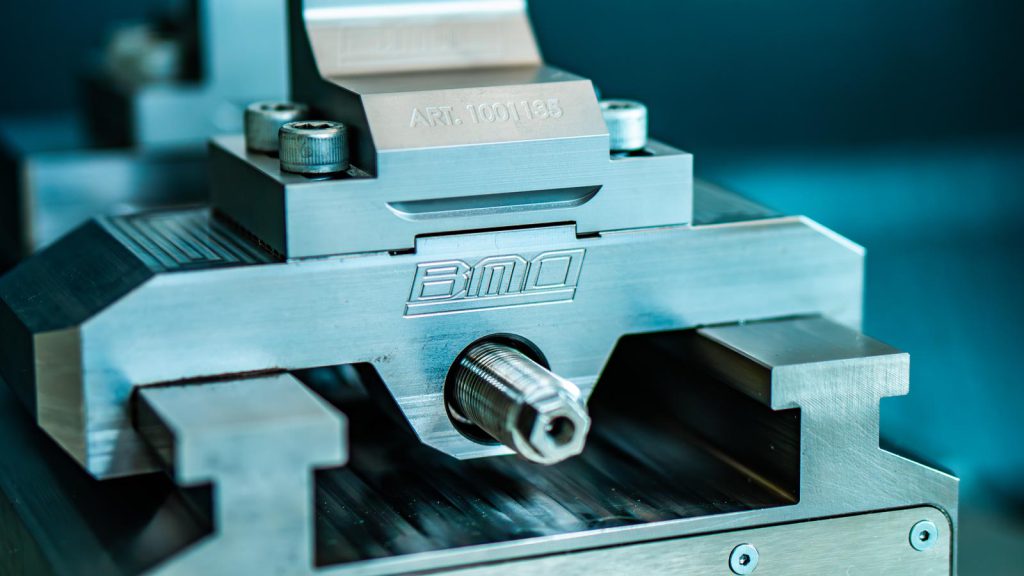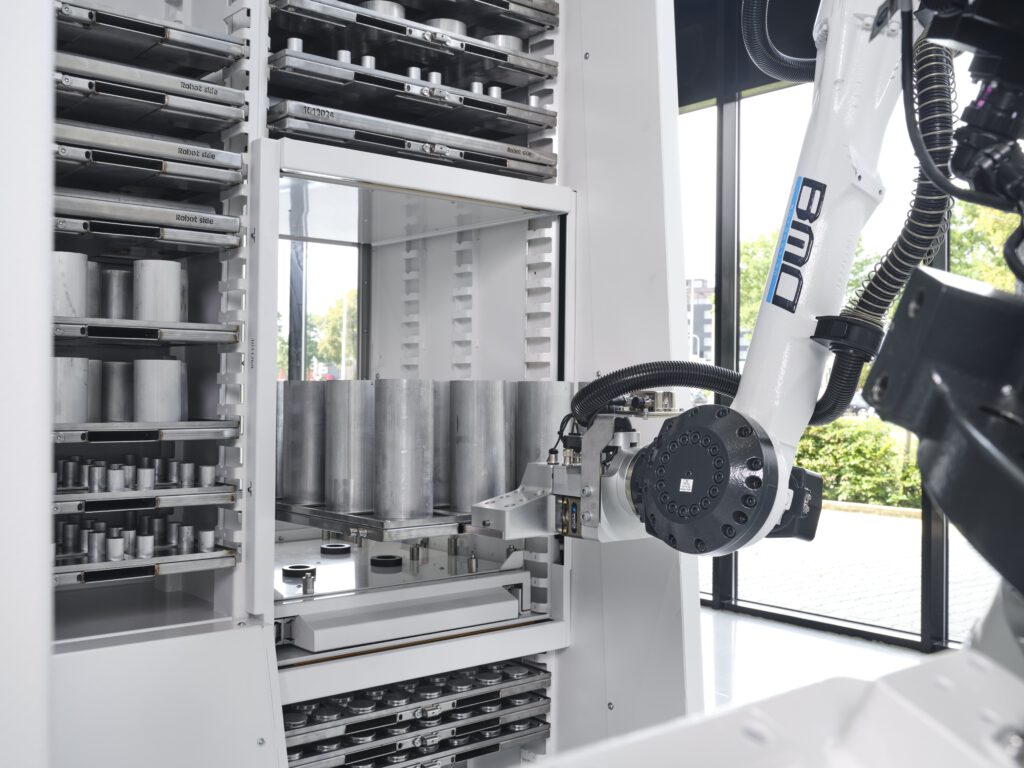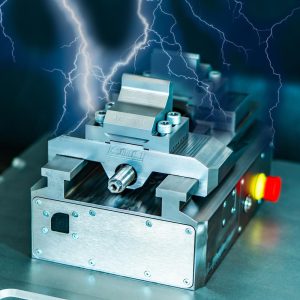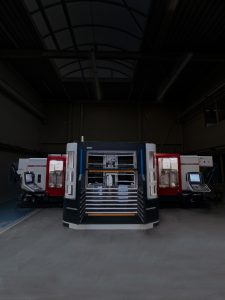BMO Automation is introducing a completely new CNC automation platform at EMO Hannover: Infinity.
The modular platform consists of a robot module and dynamic storage system and will be joined at the EMO by another game changer: a self-adjusting vice called OptiVice. These provide machining companies with solutions for more efficient deployment of scarce CNC operators, leading to higher CNC machine utilisation rates. ‘We provide the building blocks with which machining companies can start creating an autonomous factory today – the machining ecosystem of tomorrow,’ says founder and CEO Frank Biemans.
In the machining industry, the fully autonomous factory is still just a dream. Frank Biemans does not expect that many companies will ever take the step of building such a factory from scratch in one go. ‘The autonomous factory is not a project, but rather a process in which you take incremental steps towards the final goal,’ he says. This makes it even more important that when a company invests in automation today, those solutions will still be usable in the autonomous factory of the future. This is precisely the essence of the INFINITY Platform.
Dynamic storage
At the heart of the new Infinity platform is a standardised robot module (Yaskawa 50, 88, 180 or 225 kg), control hub, and storage area: the next generation robot cell. The robot module has space for forty 600 by 400 mm carriers, and can be expanded with storage modules for 400 by 600, 600 by 600 or 800 by 600 mm trays.
These can be used to store materials, workpieces, vices, jaws, robot grippers, crates… you name it. The Infinity even has room for storage on a euro pallet. The BMO software controlling the cell automatically determines the distance between two carriers in the rack, depending on what is on the tray. Algorithms continuously evaluate the most ideal arrangement. Dynamic storage is essential, because machining companies make products of different sizes every week. BMO Automation intentionally puts all the intelligence into the robot and software, not the hardware itself. Frank Biemans: ‘Any actuator or sensor can cause a failure. In our system, the robot is essentially the actuator; the robot places the carrier containing the raw material, machined product, pallets, or fixture tools in the rack. Because the software controls everything, you have maximum storage flexibility. And because we choose the reliable Yaskawa industrial robots, the system is robust and fault-tolerant.’ This keeps the total cost of ownership low, which has a direct effect on the hourly rate.
Moreover, a user can expand the number of carrier positions on a modular basis when there is a need for more storage capacity— and at any future time as well, so the system can grow with the company. BMO offers a range of flexible solutions for this. In addition, the Infinity platform is prepared for the integration of an AMR (Autonomous Mobile Robot) as standard, and you can expand the Infinity platform with a handcart docking module. The same robot then unloads these handcarts.
OptiVice: self-adjusting vice
In the autonomous factory of the future, CNC machines will configure themselves for the product to be machined. BMO Automation is already making this possible with the new OptiVice, which reduces the set-up time for a different product to zero. This is possible because this new, electric vice adjusts itself to the material to be machined. The OptiVice’s stroke is 130 mm, providing a clamping range of 0 to 130 or 90 to 220 mm. The vice draws power from an integrated battery.
This allows the vice to be placed on any machine, regardless of whether it has preparations for automation, such as a feed-through in the 5-axis machine table. Frank Biemans: ‘With this OptiVice we reduce set-up time to zero and companies can automate more small batches or even single pieces in unmanned hours. They can switch between producing various batches without the need for extra pallets with vices and without changing vices.’
The chance of an incorrect setting by the operator is also reduced to zero. If the vice does not reach the required clamping force for any reason, during the day a warning is provided and at night the next production task starts automatically. The OptiVice has an open construction. Practical tests show that this does not cause any problems with chips getting stuck in its parts. Frank Biemans: ‘Because we make use of an open system, we can use the machine’s cooling lubrication system to rinse the vice clean. You configure how often this should be done in the software.’
With the OptiVice automatic vice, BMO Automation further reduces set-up time. This is especially noticeable in small series, where most of the lost time is spent changing vices or clamping jaws.
Job differentiation
With its Infinity platform, BMO is also taking the first step towards job differentiation in machining. Frank Biemans argues for a distinction between logistics tasks and work for which you really need machining knowledge. He wants to eliminate the many hours a CNC operator now spends loading the robot cell and removing all the products the next day. This is why BMO Automation is introducing the supply chain crate. This standardised crate, widely used in the automotive industry, holds the product carriers. These crates are placed in the Infinity cell via the set-up module or the AMR docking module, after which the robot places the crates in the correct location in the dynamic storage.
Frank Biemans: ‘The idea is that the crate is filled in the in-house sawing department or at the material supplier and then placed in the robot cell in its entirety. This eliminates the need for staff to spend half a day placing raw material in the cell and then removing the processed products.’ After all, the robot can also put the parts back in the same crate or another crate. For high-quality or scratch prone workpieces, for example, the robot can also place them in a crate with foam protection to prevent damage. BMO Automation calls this crate the ‘supply chain crate’ because it can go through the entire chain. In other words, the crate containing the machined components can be delivered to the customer or the next step in the chain.
Future-proof automation
With these game changers, BMO Automation is giving machining companies building blocks to make future-proof investments in automation. The flexible layout and virtually unlimited storage capacity of the Infinity and OptiVice provide solutions for CNC machines today, and they are also suitable for future use in the autonomous factory.
‘The difference between automation today and in the future is that we are currently focussed on island automation—the robot at one or two CNC machines—whereas in the future we will automate the entire factory, with tooling, materials and workpieces stored much more centrally, for autonomous distribution to the machining centres,’ says Frank Biemans, sharing his vision of the future of machining.
In a few years, when companies transition to autonomous factories, the Infinity concept can be moved to a central location and provide stand-alone distribution.
Better use of expertise
Today, these innovations already allow companies to fully leverage their scarce CNC specialists where they add value. And that is not when loading the robot cell. Frank Biemans: ‘That is a task for the logistics worker or, in the future, perhaps an AMR.’ As a result, companies are seeing their OPR (Operator Performance Ratio) improve significantly.
BMO Automation recently introduced this KPI because, according to Frank Biemans, at a time when skilled workers are scarce, the efficiency of employees is more important than that of machines. ‘If you take a close look at time losses with the current approach to the work, you see that every hour lost by an operator—because they are loading a cell or setting a vice, for example—results in three hours less output from the CNC machine throughout the day.’




